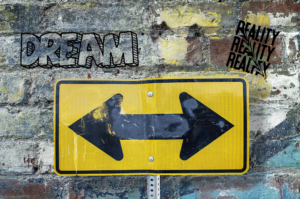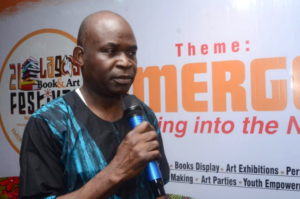
Dr. Reesom Haile, the former Poet Laureate of Eritrea and known as the first internationally known poet of his country, has left behind a legacy that makes him a true literary icon of the continent.
Brittle Paper has recently been gifted the opportunity by his daughter, Desta Haile, to share with you all an unpublished essay he had written in the late seventies, “Beentoism: A Critical View”. Desta once said that her father “was some kind of magic realism, somehow larger than life. So much so that even 17 years after he passed away I still get big smiles and bear hugs from strangers in D. C, Brixton, Matonge and beyond when they find out that I’m ‘Gual Reesom!’ The simplicity and humour with which he wrote his poems still resonates with so many, uplifting and inspiring Eritreans of all ages and backgrounds […] I hope his poetry continues to reach new international audiences and that people generations from now will be able to enjoy his writing and hear his voice.”

Born and raised in Eritrea, Dr. Reesom Haile left to continue his studies in the United States where he was awarded his doctorate in Media Ecology by New York University. After a twenty-year exile, Haile returned to Eritrea after having worked with UN Agencies and NGOs around the globe. Among his many literary achievements, Haile’s first poetry collection, waza ms qumneger ntnsae hager, won Eritrea’s highest literary award in 1998, the Raimok Prize. Other poetry collections include the English published We Have Our Voice in 2000, and We Invented the Wheel in 2002. Besides the written work, his poetic performances in English as well as Tigrinya have been revered both on the African continent and globally. On his literature written in his mother tongue, Haile said that to go “back to what God has given you and saying ‘I’m not going to give it up.’ It’s your freedom… your speech… your self definition… your self expression and you cannot give it up.”
This freedom and going back to what God has given you is something that Ngũgĩ wa Thiong’o proudly comments on as well when he says that “Haile talks of the arrival of a new generation knowing many languages. This new generation accepts the reality of an Africa of many languages and is determined to create a shared legacy in them. Dialogue between African languages is vital.”
Without further ado, here is Haile’s previously unpublished 1979 essay.
Reesom Haile
January 1979
Beentoism: A Critical View
Beentoism is a term used in reference to a post-colonial phenomenon in Africa, characterised by a mass exodus of young Africans in pursuit of education at the centers of learning in former colonial countries as well as other developing societies. The word itself is made up by combining the word “been” and “to”, (as in been to Oxford, Harvard, N.Y.U, etc) and parallels tribal names like “Bantu” and “Kikuyu”. It implies that there is a new tribe in Africa that is formed by a commonality of experiences that include having been outside Africa for education. Similarly, those Africans who engage in conspicuous consumption are sometimes referred to by the term “Wabenzi,” after the German automobile Mercedes Benz, a favourite status symbol. However, conspicuous consumption would be included in the world view suggested by Beentosim.
The historical origins of the Beentoist phenomenon go back to Africa’s colonial past. Missionaries, colonial administrators, and their apologists have long condemned African societies as backward, primitive, and lacking civilization and God. As a result, the colonial challenge was perceived as one that would involve the Christianisation, education and general civilisation of its people. The colonial, political, economic, cultural, and ideological systems were thus conceived and designed to bring the African population into a dependent relationship with the coloniser.
However, it would seem that the African struggle for national independence would have radically changed this relationship. But in fact, the open secret of post-colonial Africa is that little has changed and Beentoism is one of the manifestations of the continuation of dependent relationships between African nation states and former colonial powers.
Beentoism is a form of dependency. It is also a system of assumptions about the nature of man, the nature of society and the nature of knowledge and truth.
As an educational philosophy, it has several components:
- That education is some objectifiable thing and that it can be acquired or possessed (e.g., get a B.A, an M.A, or Ph. D.
- That education is to be found at some definite place like a university in Europe, the United States or other centers of the developed world.
- That education is an individual occupation and necessitates the departure from one’s original environment and the putting aside of one’s language, customs, way of life and general world view.
- That education abroad is better than any that could be experienced at home.
Thus, once education is acquired at the proper places of learning, one can go back to the original environment and assume a position of leadership and influence, as a matter of Beentoist right.
Many an African has been shipwrecked on this adventure. In the many years that I have pursued my own Beentoist plans, I have yet to come across this thing called education. In my opinion, education is a process, a critical process that involves a complex set of relationships with nature and society. It is a practice that requires as a minimum that one challenge the assumptions and prescriptions of social, political, economic, and cultural environment as well as one’s own. It is a process of self-creation in action and thought. Defined in this way, the African need not be sequestered from his/her environment. This is not to deny that the universities in developed countries can afford an experience conducive to critical action and thought but rather that they seem more suited for the purposes dictated by the social and political structures of which they form an integral part. This brings me to the context of education implied in the Beentoist philosophy.
To adopt a critical view of one’s natural and social environment one needs to interact with that environment. For instance, it is axiomatic that language, the language of a society, is both a means to and a store of historical, political, economic, ideological, and cultural experiences of that society. To understand the language of a society is to be privy to that society’s past, present, and future. And yet Beentoism is characterised by the adoption of languages other than one’s own. It is illustrative of the more comprehensive alienation from one’s history, society and culture which may not be immediately apparent. A change in environment implies a change in the elements that constitute a part of that environment which in this case is the unsuspecting Beentoist; unsuspecting, that is, until the return to the origin which will have also changed in the meantime.
What is lacking in the Beentoist approach to education may be summarized thus:
- An appreciation of the complexity of individual life by focusing on the individual without the formative inter-relationship the individual maintains with nature and society.
- An appreciation of the historical and structural constituents of society, those that determine and sometimes decisively determine the course of the individual, and social life and consequently the purposes of education.
- An appreciation of education as a process instead of a thing to be gotten, acquired, or possessed.
There is every reason to believe that the Beentoist phenomenon will become even more marked in the coming years. The relationship between developed and developing countries over a whole range of political, economic, and cultural ties seems destined to deepen the extant dependency of developing countries. African trends are no exception. Furthermore, the change in the process of education for the African students will require a change in the more fundamental structure of the world economy.
For those already familiar with Haile, we hope you enjoyed this feature, and for those who only met him now, we hope you continue on this path of getting to know the work of this legendary African literary icon.
This feature has also been greatly influenced by the phenomenal research of Mehreteab Abay and Emnetu Tesfay’s “A Short Biographical Sketch of Dr. Reesom Haile”. All images have been provided by Desta Haile.









COMMENTS -
Reader Interactions